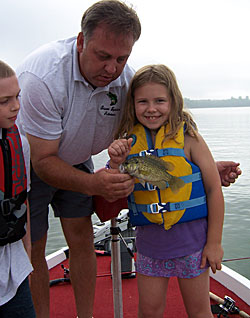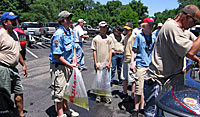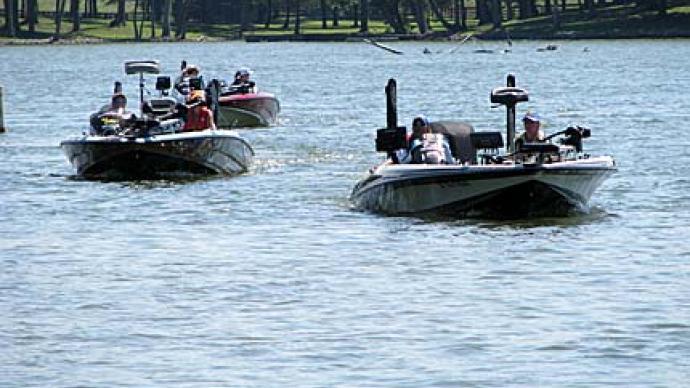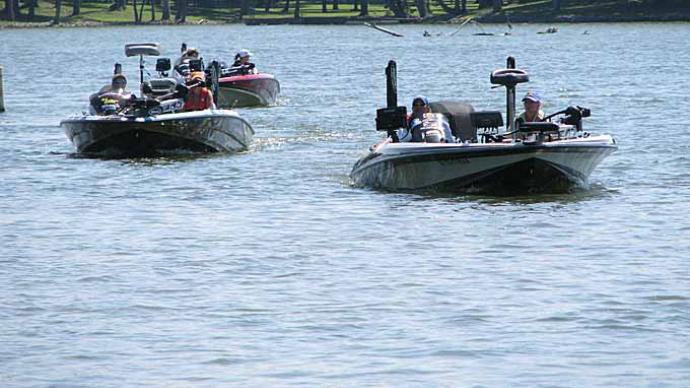| Fishing On Course For College Scholarships |
|
Of course, the main reason most anglers want to introduce their kids to bass fishing is to give them an entertaining and educational pastime that will serve them throughout life. But hey, you know what? Fishing may someday be a way to pay for their education, too. With the growth of youth clubs and competitions, ensuing tournaments have grown into the college ranks such as the BoatU.S. National Collegiate Bass Fishing Championship (collegiatebasschampionship.com). (Twenty-nine collegiate bass teams fished in the inaugural BoatU.S. Lone Star Spring Breakout bass tournament in March 2008.) One of the ultimate goals for this kind of college competition is to establish a process for funding and awarding fishing scholarships to college students. Can you imagine? Now that would be yet another reason to teach your kids to fish! - Taylor Wilson |

The latest report by the U.S. Fish and Wildlife Service paints a grim picture for the future of fishing. According to the survey, which gauges fishing, hunting and wildlife viewing activity among Americans, the number of anglers dropped a whopping 15 percent between 1996 and 2006, and fishing-related spending dropped even more. Worse, the recruitment rate for children was down 15 percent, as well.
So what can a bass club do to curb that downward trend? Start a youth club, of course. The benefits are obvious: More boys and girls who fish now translates to more adults who carry on the fishing tradition throughout their lives. And they are more likely to pass that passion on to their own children.
"State fish and wildlife agencies depend on license revenue to pay for conservation police officers, biologists and programs that not only benefit individual fisheries and fish species, but the environment as a whole," said Mark Gintert, national youth director for The Bass Federation. "Anglers are often the best and most vocal advocates of clean water, so without a strong support base, our waters will certainly suffer, and so will our fishing."
The short-term benefits are far more tangible, however. The mere sight of a child landing his first bass or the biggest largemouth of his life is almost as thrilling as catching a 10-pounder yourself.
"It's really a lot of fun working with kids in a youth club," said Doug Clifford, youth director for the Ohio Bass Federation. He has helped his state's youth program grow from a handful of Federation-affiliated clubs to 15 throughout the state. "I've been doing it for a long time and I haven't gotten tired of it yet. I really look forward to every meeting I attend. The enthusiasm and maturity these kids show is really amazing."
Getting Started

The first step for any club interested in starting a youth group is to gauge interest from the membership. Without a strong commitment and a willingness to support a youth club, both financially and with manpower, there's no point in moving forward with the idea.
"It really doesn't take a huge amount of work, at least not for the entire club," said Clifford. "You certainly need someone who is willing to step up and serve as the adult leader, and you need the general support of the membership, but it's not really that difficult."
He added that once an adult club decides to move forward, it's critical to figure out exactly what kind of youth club it's going to be. Will it consist of serious anglers who want to compete in tournaments against other youth clubs, or is it going to be a club for all kids, no matter how skilled they are at fishing when they join? It's counterproductive to drop two or three really good anglers into a club full of boys and girls who are just learning how to tie basic knots, especially if the club's focus will be tournament fishing. Clifford said the best clubs he has been involved with are clubs that don't place any emphasis on competing or winning. That's not why most kids fish and frankly, it's not the best path to introduce beginning anglers to the sport.
"I know most adult clubs take their tournament fishing pretty serious, but I've seen a lot of kids get burned out on competitive fishing before they reach adulthood. The whole idea of a youth club is to foster a love of the sport and I think the best way to do that is to focus on having fun," he added. "There are certainly plenty of boys and girls who excel at tournament fishing at a young age and who stick with it when they become adults, but I don't think it's a good idea to push them too hard too soon."
Keep 'Em Busy
In other words, keep your youth club focused on fun for everyone. Clifford said the most important-as well as the most obvious-way to maintain the young anglers' interest is to take them fishing. One of the biggest hurdles any adult club will face when it wants to take a youth club fishing is rounding up enough boats to accommodate everyone. That's not too difficult to overcome, at least not for youth clubs that aren't focused entirely on competitive bass fishing. Clifford said many youth clubs rarely fish from boats. Instead, they visit local lakes with ample shoreline access.

"There is a youth club here in Ohio that goes to a small lake that has been heavily stocked with bass and bluegill, so there's almost a guarantee that everyone will catch at least a few fish. That's real important to maintaining a high level of interest. If the kids go to a lake and only one or two of them catch anything, they'll get discouraged and they'll lose interest pretty quick," Clifford said. Most kids don't care what they catch, as long as they get the chance to feel the tug of a fish on the end of their line. For a tournament-oriented club that wants to focus on bass, however, boats are a vital part of the club's success. Without them, it's tough to pull off a full-blown bass tournament. Clifford admitted that rounding up enough adult boat owners willing to shuttle kids around a lake on a nice Saturday can be tough, but it's not impossible. Club members can, and often do use any boat they can safely put in the water. It doesn't have to be a brand new Ranger. The kids are just happy to be in a boat with a fishing rod in their hands.
He said most Federation-sponsored clubs hold three or four tournaments a year, but there are many more activities the young anglers can undertake when they aren't fishing. Clifford said most clubs are involved in conservation projects like fish habitat restoration, lake or river bank clean-ups, and other projects that benefit local waters.
"I know of a couple of clubs that hold fishing events for other children and even nursing homes. The kids turn into teachers themselves and they really do a great job at it. They discuss tactics and tackle at indoor meetings and they'll even go to outdoor shows in the winter as a group. Sometimes, they'll have guest speakers like a local pro or a fisheries biologist," he said.
Finding Money
A youth club, like an adult club, isn't free. So who pays for it? The kids, of course. Sure, adult members can kick in money if they want to, but Clifford said it's not critical to the success of a youth club. In fact, he said the most successful clubs, as well as individual boys and girls, do best when parents provide no financial support at all-the kids are forced to take charge. Instead, the youth members should institute a nominal annual membership fee of $10 or $15. That's not much, but it's a good way to start building a coffer for expenses like trophies, snacks and other incidental items. In order to pay for larger projects and big-ticket items that may come up over time, clubs can hold fund-raising events like raffles and drawings of donated items. The club members will have to solicit potential sponsors to get those items, but Clifford said he is amazed at how ambitious and responsible kids can be when they are give important tasks, especially when it directly benefits their club. In some cases, the kids can solicit financial support from various businesses like local tackle shops or even businesses that have no connection to fishing.
"You have to remember that a youth fishing club shouldn't just teach kids about fishing, it should teach them responsibility and the value of money. These are all lessons they need to learn before they reach adulthood and a club that they are responsible for funding and maintaining is a great way to reinforce those lessons," he said.
In other words, the youth club's adult mentor should provide plenty of guidance, but she should do it from a distance. Clifford said it's important for parents and adult club members to give the youth club plenty of space, as well. However, they should also be there when the kids need assistance. Sometimes the boys and girls simply don't know how to find and approach businesses for sponsorship.
The Liability Factor
Perhaps the most common question Clifford hears from clubs considering sponsoring a youth club has to do with liability. Fishing is an extremely safe activity, but the risk of a boating accident, an errant hook, or some other injury is certainly a possibility.
"If the adult club is a sanctioned Bass Federation club and the youth club is under your watch, then the club and its activities will be covered by the TBF's insurance," explained Clifford. "If it's not a TBF club, boat insurance policies typically cover all passengers, but you should always check with your insurance agent before you start taking kids out.
"There are all kinds of measures that can be put in place that remove any question of risk to the children. Adult clubs can institute a boat speed limit for youth events and they can make sure all kids are fishing in pairs when they are with a non-parent adult."
The real risk is not mentoring children to become the next generation of conservationists and environmental advocates. Starting a youth club does take time and a commitment, but once you take the plunge, you'll be surprised at how much fun it is to watch boys and girls develop into skilled anglers. The future of fishing depends on it.
For more information, contact The Bass Federation at 330-993-0014, or visit www.bassfederation.com; or The Bass Federation Nation at 877-BASSUSA, or www.bassmaster.com. Both have solid youth programs and a support network to help your club sponsor a youth program. The Bass Federation is affiliated with FLW Outdoors; The Federation Nation is affiliated with B.A.S.S.




